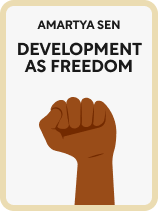

This article is an excerpt from the Shortform book guide to "Development as Freedom" by Amartya Sen. Shortform has the world's best summaries and analyses of books you should be reading.
Like this article? Sign up for a free trial here .
What are John Rawls’ principles of justice? How does his theory exercise fairness and give people free agency?
The Rawlsian justice theory is described in Development as Freedom by Amartya Sen, who compares the relatively modern theory to utilitarianism and libertarianism. John Rawls’ theory proposes an emphasis on liberty to allow people to succeed or fail at their own will.
Check out more on the pros and cons of Rawls’ principles of justice.
Rawlsian Justice
In A Theory of Justice, published in 1971, Harvard philosopher John Rawls presents a moral model, “justice as fairness,” which tries to reconcile notions of liberty and equity.
In Sen’s interpretation, the purpose of Rawls’ principles of justice is to allow individuals a better chance to pursue their objectives. To attain their objectives, they need “primary goods.” These primary goods include rights, freedoms, opportunities, and income. Together, these primary goods provide people a just or fair chance to succeed or fail on their own merits.
Pros of Rawlsian Justice
Rawls’s principles of justice value freedom for its own sake (what he calls the priority of liberty). Rawls also values other primary goods, meaning that he considers more than freedom in his evaluations. Sen agrees with Rawls that primary goods—aside from liberty—are vital as well.
Cons of Rawlsian Justice
Sen argues that for very poor nations, the “priority of liberty” can overemphasize freedom and risk overlooking the basic economic needs of the poor.
While Sen values negative rights, he also champions positive rights like safety nets and public health programs he deems vital to his idea of freedom. For example, Sen would likely favor progressive tax rates to redistribute some of the highest earners’ income to poorer people.
(Shortform note: By “negative rights,” we mean the rights of a person to be free from external violations of liberty, such as coercion. By “positive rights,” we mean peoples’ claim to entitlements to secure a baseline level of welfare.)
Economics and “Distributive Justice”
Rawls’ principles of justice Sen addresses seek to address a fundamental question of economics: How should resources be distributed within a society? The arguments about which arrangements are morally preferable fall under the category of “distributive justice.”
For Rawls, justice is based on what he calls the “difference principle,” which has these components:
- Each person has an equal claim to a set of rights and liberties.
- For social and economic inequality to be just, it must satisfy two conditions:
- Unequal outcomes are acceptable when everyone has an opportunity to attain them. For example, if someone becomes rich by becoming a famous musician, this is considered just because everyone has an opportunity to do so.
- Inequality can be tolerated if it benefits the least advantaged members of society. If an entrepreneur builds a fortune by inventing a new technology, his greater income can be tolerated if that technology improves conditions for the disadvantaged.
If inequality fails to satisfy these two conditions, then Rawls believes in redistributing resources to improve conditions for disadvantaged people, as long as it doesn’t infringe upon anyone’s basic liberties.

———End of Preview———
Like what you just read? Read the rest of the world's best book summary and analysis of Amartya Sen's "Development as Freedom" at Shortform .
Here's what you'll find in our full Development as Freedom summary :
- The five types of freedom that are integral to economic development
- How democracy can prevent famine
- How empowering women helps communities






